中职英语第一册
- 格式:doc
- 大小:40.50 KB
- 文档页数:4
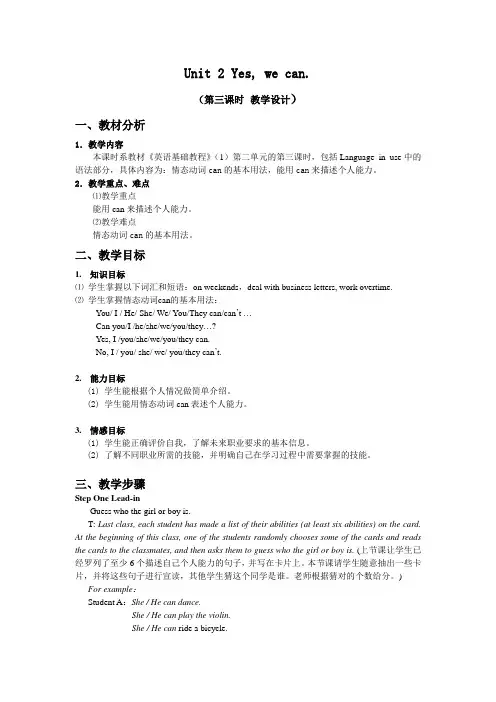
Unit 2 Yes, we can.(第三课时教学设计)一、教材分析1.教学内容本课时系教材《英语基础教程》(1)第二单元的第三课时,包括Language in use中的语法部分,具体内容为:情态动词can的基本用法,能用can来描述个人能力。
2.教学重点、难点⑴教学重点能用can来描述个人能力。
⑵教学难点情态动词can的基本用法。
二、教学目标1.知识目标⑴学生掌握以下词汇和短语:on weekends,deal with business letters, work overtime.⑵学生掌握情态动词can的基本用法:-You/ I / He/ She/ We/ You/They can/can’t …-Can you/I /he/she/we/you/they…?-Yes, I /you/she/we/you/they can.-No, I / you/ she/ we/ you/they can’t.2.能力目标(1) 学生能根据个人情况做简单介绍。
(2) 学生能用情态动词can表述个人能力。
3.情感目标(1) 学生能正确评价自我,了解未来职业要求的基本信息。
(2) 了解不同职业所需的技能,并明确自己在学习过程中需要掌握的技能。
三、教学步骤Step One Lead-inGuess who the girl or boy is.T: Last class, each student has made a list of their abilities (at least six abilities) on the card. At the beginning of this class, one of the students randomly chooses some of the cards and reads the cards to the classmates, and then asks them to guess who the girl or boy is. (上节课让学生已经罗列了至少6个描述自己个人能力的句子,并写在卡片上。

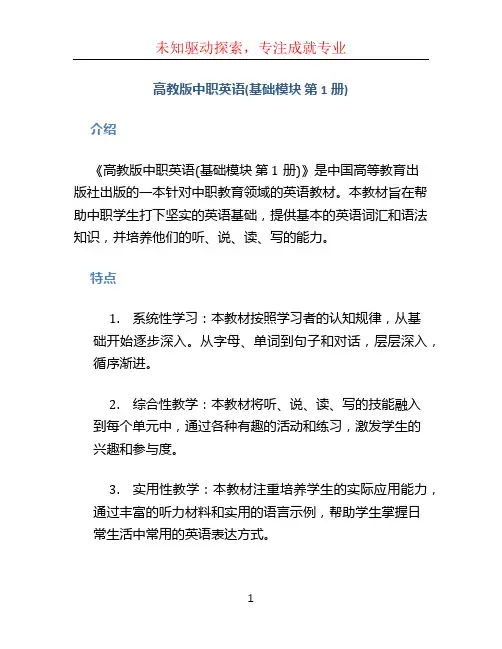
高教版中职英语(基础模块第1册)介绍《高教版中职英语(基础模块第1册)》是中国高等教育出版社出版的一本针对中职教育领域的英语教材。
本教材旨在帮助中职学生打下坚实的英语基础,提供基本的英语词汇和语法知识,并培养他们的听、说、读、写的能力。
特点1.系统性学习:本教材按照学习者的认知规律,从基础开始逐步深入。
从字母、单词到句子和对话,层层深入,循序渐进。
2.综合性教学:本教材将听、说、读、写的技能融入到每个单元中,通过各种有趣的活动和练习,激发学生的兴趣和参与度。
3.实用性教学:本教材注重培养学生的实际应用能力,通过丰富的听力材料和实用的语言示例,帮助学生掌握日常生活中常用的英语表达方式。
内容概述本教材共分为8个单元,每个单元涵盖以下内容:单元1:字母与发音•学习英语26个字母及其发音规则•练习正确发音•分辨字母大小写单元2:数字与数量•学习基本数字及其用法•表达时间、年龄、日期等数量单元3:个人信息•学习表达个人信息,如姓名、年龄、国籍等•掌握常见的形容词和人称代词单元4:问候与介绍•学习日常问候语和自我介绍的方式•了解常用的礼貌用语和相互之间的称谓… …单元8:购物与交流•学习购物时常用的词汇和句型•培养通过交流解决问题的能力学习方法针对中职学生的特点,本教材提供了一些学习方法和技巧,帮助学生更有效地掌握英语知识:1.多听多说:通过听录音和模仿说话,提高听力和口语表达能力。
2.多读多写:通过大量阅读和写作练习,培养阅读理解和写作能力。
3.积极参与:利用课堂活动和小组讨论,积极参与课堂学习,提高学生的合作和沟通能力。
4.多用多练:通过大量的练习题和口语对话,巩固和应用所学的知识,加深理解。
结语《高教版中职英语(基础模块第1册)》是一本专门为中职学生准备的英语教材,旨在帮助他们打下坚实的英语基础。
通过系统性的学习和实用性的教学方法,学生将能够掌握基本的英语词汇和语法知识,并能够流畅运用在日常生活中。
希望这本教材能为中职学生的英语学习提供有力的支持。



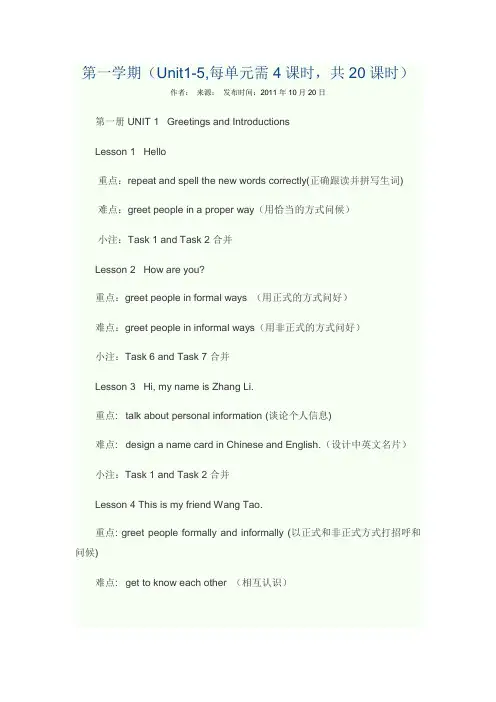
第一学期(Unit1-5,每单元需4课时,共20课时)作者:来源:发布时间:2011年10月20日第一册UNIT 1 Greetings and IntroductionsLesson 1 Hello重点:repeat and spell the new words correctly(正确跟读并拼写生词)难点:greet people in a proper way(用恰当的方式问候)小注:Task 1 and Task 2合并Lesson 2 How are you?重点:greet people in formal ways (用正式的方式问好)难点:greet people in informal ways(用非正式的方式问好)小注:Task 6 and Task 7合并Lesson 3 Hi, my name is Zhang Li.重点: talk about personal information (谈论个人信息)难点: design a name card in Chinese and English.(设计中英文名片)小注:Task 1 and Task 2合并Lesson 4 This is my friend Wang Tao.重点: greet people formally and informally (以正式和非正式方式打招呼和问候)难点: get to know each other (相互认识)UNIT 2 School and Daily LifeLesson 1 What do you usually do at school ?重点: repeat and spell the new words correctly(正确跟读并拼写生词)难点: read the new words in the sentences fluently (在句子中熟练地读出生词)小注:Task 1 and Task 2合并Lesson 2 What’s your favorite sport ?重点: talk about your favorite things (简单地谈论你最喜爱的事情)难点: talk about your interests (简单谈论你的兴趣爱好)小注:补充各专业课程名称,比如:电子(electronic)Lesson 3 What do you usually do after school ?重点: talk about your activities after school (谈论你的课外活动)难点: understand and use the simple present tense (理解并会使用一般现在时)小注:补充动词单数第三人称现在形式构成的习题wash, carry, say, guess, watch, snow, go, playLesson 4 I enjoy my school life.重点: describe your school life using the simple present tense(用一般现在时描述你的学校生活)难点: Write after the example(仿写作文)UNIT 3 TimeLesson 1 What time is it ?重点: repeat and spell the new words correctly(正确跟读并拼写生词)难点: read the new words in the sentences fluently (在句子中熟练地读出生词)小注:Task 1 and Task 2合并Lesson 2 What’s the date today ?重点: spell the datesand weeks (拼写日期和星期)难点:talk about the dates and weeks (谈论日期和星期)小注:补充一周七天Lesson 3 It’s time to play football.重点: use “it’s time to…” correctly (正确使用该句型)难点: talk about time, date, weekday with the patterns learned (用学过的句型谈论时间、日期和星期)小注:Task 4 and Task 5合并Lesson 4 When does the library open ?重点: ask questions of time using “does”( 用“does”提问时间)难点: talk about daily activities (简单谈论日常活动安排)Unit 4 WeatherLesson 1 What’s the weather like today ?重点: repeat and spell the new words correctly(正确跟读并拼写生词)难点: read the new words in the sentences fluently (在句子中熟练地读出生词)小注:Task 1 and Task 2合并Lesson 2 How is the weather in your city ?重点: talk about the weather in different places (谈论不同地方的天气)难点: give some suggestions based on the weather (根据天气情况提出一些建议)Lesson 3 What are you doing now ?重点: talk about things happening at the moment (谈论正在发生的事情)难点: talk about things happening at the moment(谈论正在发生的事情)小注:补充现在进行时的练习题Lesson 4 What’s your favorite season ?重点: describe the weather and what people are doing (描述天气状况和人们正在做什么)难点: talk about the weather in each season in a place (谈论某地每个季节的天气状况)Unit 5 Asking the wayLesson 1 Can you tell me where Carrefour Supermarket is ?重点: repeat and read the new words correctly (正确跟读并拼写生词)难点: say the words in the sentences fluently (在句子中熟练地读出生词) 小注:Task 1 and Task 2合并Lesson 2 How can I get to the nearest car park ?重点: ask and tell the way using the sentence patterns learned (用所学的句型问路、指路)难点: express thanks (表达感谢)小注:Task 6and Task 7合并Lesson 3 Which bus goes to Qilu Hospital ?重点: use prepositions of direction to describe how to get somewhere by bus (用方位介词说出如何乘公交车去某地)难点: ask for and give directions ,using can ,may, must 用can ,may, must((问路指路)小注:添加“link with reality”Lesson 4 Is there a bookshop nearby?重点: identify places (识别方位)难点:ask for and give directions, using the prepositions of direction correctly (正确使用方位介词指路和问路)小注:Task 6改成link with reality第二学期(Unit6-10,每单元需4课时,共需20课时)作者:来源:发布时间:2011年10月20日Unit 6 Food and ServiceLesson 1 Would you like something to eat?重点: repeat and write the new words correctly(正确跟读并拼写生词)难点:say the words in the sentences fluently(在句子中熟练地读出生词)小注:Task 1 and Task 2合并Lesson 2 It tastes delicious!重点: invite friends to do something (用所学句型邀请朋友)难点: accept or refuse an invitation properly (恰当地接受或拒绝邀请)小注:补充常见食品的说法Lesson 3 You often eat fast food, don’t you?重点: invite friends to do something (用英文邀请朋友做事情)难点: read English invitation cards (看懂英文请柬)小注:Task 6 and Task 8合并Lesson 4 Why do you go to the fast food restaurant so often?重点: answer the “why” questions (回答用“why” 提出的问题)难点: ask questions of different types( 提问不同类型的问题)小注:Task 3 补充讲解习题Unit 7 Seeing a doctorLesson 1 How do you feel?重点: repeat and write the new words correctly(正确跟读并拼写生词)难点:say the words in the sentences fluently(在句子中熟练地读出生词) 小注:Task 1 and Task 2合并Lesson 2 I an feeling terrible.重点: say how you are feeling to others (向他人描述自己的身体状况)难点: give advice based on how others feel (根据他人身体状况给出建议) 小注:Task 3and Task 5合并Task 6 and Task 7合并Lesson 3 You should go to see a doctor重点: ask the doctor for advice (向医生征求建议)难点: offer suggestions (提建议)小注:Task 6 and Task 5合并Lesson 4 Don’t play for too long!重点: use the words and the patterns learned in given situations (在给定的情景中使用所学单词和句型)难点: offer suggestions (提建议)小注:Task 5删除Unit 8 InvitationLesson 1 Are you free this afternoon?重点: repeat and write the new words correctly(正确跟读并拼写生词)难点:say the words in the sentences fluently(在句子中熟练地读出生词) 小注:Task 1 and Task 2合并Lesson 2 Would you like to go swimming?重点:invite friends to do something using the sentence pattern learned (用所学的句型邀请朋友做事)难点:accept or refuse an invitation (接受或拒绝邀请)小注:Task 5 and Task 6合并Lesson 3 I’d love to ,but I’m not free.重点: invite sb to do something (邀请某人做某事)难点:read and reply to an invitation card (看懂并回复英语请柬)小注:Task 7删除Unit9 Past EventsLesson 1 Were you at school last weekend?重点:repeat and spell the new words correctly.(正确跟读并拼写生词)难点:Describe the past events and your own past experience.(描述过去的事情和自己过去的经历)小注:Task 1 and Task 2合并Lesson 2 What did you do last weekend?重点:Tell sb what you did during the past time.(告诉别人过去发生的事情)难点:Describe people’s past action.(描述别人过去做过的事情)小注:Task 6 and Task 7合并Lesson 3 Did you have fun at school?重点: Write about what you did during the past time.(写出你过去做过的事情)难点: Apologize to sb for things happened in the past..(为过去发生的事情道歉)小注:Task 1 and Task 2合并Lesson 4 I am really sorry.重点: Use the sentence patterns and words learned in the given situations.(在既定的情景下使用所学句型和单词)难点: Use past tense in a diary.(用过去时写日记)Unit 10 Festivals and Holidays.Lesson 1 Christmas is on December 25th.重点:Repeat and spell the new words correctly(正确跟读并拼写生词)难点:Say the dates and origin of main festivals.(能说出主要节日的日期)小注:Task 1 and Task 2合并Lesson 2 Merry Christmas!重点:Greet people and respond to greetings during festivals.(节日祝愿和应答)难点:Talk about the meaning of festivals and sing Christmas song.(谈论节日的意义和唱圣诞歌曲)小注:Task 6 and Task 7合并Lesson 3 What do you do during the holiday?重点: Talk about how to spend your holidays. (谈论如何度过假日)难点: Use and, but and or in sentences correctly..(正确使用三个连词)小注:Task 1 and Task 2合并Lesson 4 What are you going to do during the festival?重点: Use the patterns and words learned skillfully. (熟练使用本单元所学的句型和词汇)难点: Talk about holiday plans. (谈论节日计划)(第二册Unit1-5,每单元需4课时,共需20课时)作者:来源:发布时间:2011年10月20日第二册UNIT 1 Describing PeopleLesson 1 She is pretty重点:repeat and spell the new words correctly(正确跟读并拼写生词)难点:describing people use simple words(简单描述人的外表)小注:Task 1 and Task 2合并Lesson 2 What does she look like?重点:ask and answer question about “he is/looks/has/wears…”(用“he is/looks/has/wears…”句型谈论外貌)难点:compare people or things by using –et and -est(形容词副词比较级和最高级)小注:Task 6 and Task 7合并Lesson 3 She is polite and friendly重点: talk about one’s personality and find out the factors that affect it. (谈论人物性格及影响因素)难点: choose correct forms by using –er/-est and V-ed.(形容词副词比较级和最高级和过去分词的适当形式)小注:Task 1 and Task 2合并Lesson 4 A sport star.重点: use the patterns and words (使用本课词组和句型)难点: describe your favorite sports star’s appearqances and personalities (相互认识)UNIT 2 Feelings and OpinionsLesson 1 I am really happy!重点: repeat and spell the new words correctly(正确跟读并拼写生词)难点: read the new words in the sentences fluently (在句子中熟练地读出生词)小注:Task 1 and Task 2合并Lesson 2 How do you feel today ?重点: talk about your favorite things (简单地谈论你最喜爱的事情)难点: talk about your interests (简单谈论你的兴趣爱好)小注:补充各专业课程名称,比如:电子(electronic)Lesson 3 Only time can understand how valuable love is.重点: answer the questions according to the text (就短文的内容回答问题) 难点:recognized the conjunction and change of the object clause (识别宾语从句的连接词和时态的变化)小注:Task 1 and Task 2合并Lesson 4 I really hope everything goes well.重点: express feelings and talk about likes or dislike简单地谈论你最喜爱的事情难点: recognized the conjunction and change of the object clause识别宾语从句小注:补充宾语从句练习题Unit3 CommunicationLesson 1 Would you like to leave a message?重点:repeat and spell the new words correctly.(正确跟读并拼写生词)难点:Say the in the given situation.(在给定的句型中熟练的说处生词)小注:Task6 删除Lesson 2 Can I speak to Jim?重点:Make calls using the sentence patterns.(用所学的句型打电话)难点:Make calls with the given situation.(用所给的情景打电话)小注:Task 1 and Task 6合并Lesson 3 Internet?重点: Use the expressions to talk about the internet.(用所学的表达方式谈论互联网)难点: Recongize the present perfect tense and summarize the use of it..(识别现在完成时态的结构并总结用法)小注:Task 5 and Task 6合并Lesson 4 Have you replied the e-mail?.重点: Use the present perfect tense to complete sentence.(用现在完成时完成句子)难点: Reply an e-mail message.(回复一封电子邮件)Unit 4 Sports.Lesson 1 I like being outdoors!.重点:Pronounce and spell the new words correctly(正确跟读并拼写生词)难点:Talk about your favorite outdoor activities with others.(与他人谈论你最喜欢的户外运动)Lesson 2 I am tnterested in chess.重点:Talk about chess games in simple sentences.(用简单的句子谈论棋类运动)难点:Talk about your favorite sports and why you like them.(谈论你感兴趣的运动及原因)小注:Task 2删除Lesson 3 Olympic spirit重点: Write about your opinions on the Olympic spirit. (写出你对奥运精神的理解)难点: Find out some rules of v-ing and –er, -est..(找出相关动词ing形式,副词,比较级和最高级的语法规律)小注:Task 3 and Task 4合并Lesson 4 Sailing in Qingdao重点: Talk about your favorite sport. (谈论你最喜欢的运动)难点: Use v-ing –er -est. (使用v-ing 形容词,副词比较级和最高级进行表达)Unit 5 Travel and Transportation.Lesson 1 When are you leaving?重点:Pronounce and spell the new words correctly(正确跟读并拼写生词) 难点:Ask the information about transportation.(咨询交通信息)Lesson 2 How are you going to Mount Tai?重点:Recognize some traffic signs.(能够辨认某些常用的交通标志)难点:Use “by ” phrases to talk about ways of transportation.(用“by”引导的短语谈论出行方式)小注:P66 Task5和P69页Task5合并Lesson 3 Where do you spend the holiday?重点:Make a travel plan after the model(仿照模式制定一个旅游计划)难点:Correctly using the adverbial clauses(正确使用状语从句)小注:P69 Task3和Task4合并Lesson 4 What a great experience it is !重点:Talk with the others using the words and phrases learned.难点: Describe the places you have been to in brief.(简要描述你游玩的地方)Unit6-10,每单元4课时,共需20课时)作者:来源:发布时间:2011年10月20日Unit 6 ShoppingLesson 1 Can I help you?重点:Pronounce and spell the new words correctly正确的读出并写出生词难点:Ask for and offer service during shopping购物时寻求、提供服务Lesson 2 It’s nice and not very expensive.重点:Recognize the use of to phrase识别带to短语的用法难点:Talk about price ,color and size谈论物品的价格、颜色、尺寸小注:合并第88页Task4和第91页Task4Lesson 3 The supermarket重点:Summarize the tips about shopping通过阅读短文,总结超市购物的几条建议难点:Recognize the structure of the infinitive and summarize the use of it 识别动词不定式的结构并总结它在本单元的用法小注:补充练习题按括号中的要求写出下列单词的正确形式1. bore________ ________(n.)(a.)2. sell________(n.)3. tempt________(n.)4. advertise________(n.)答案:1.boredom boring 2.sale 3.temptation 4.advertisementLesson 4 It’s on sal e.重点:Use the patterns learned fluently熟练地使用本单元所学的句型和单词Write a short passage about shopping能根据提示写一篇关于购物的短文难点:Tell the use of the infinitive correctly正确地说出动词不定式的用法Unit 7 JobsLesson 1 I’m looking for a job.重点:Pronounce and spell the new words correctly正确地写出并拼写生词难点:Recognize the structure of job advertisement识别求职广告的结构小注:删除第100页Task5Lesson 2 Fill in this resume, please!重点:Talk about the information in a resume 谈论简历表上的个人信息难点:Fill in one’s resume in English 填写英文检历小注:合并第103页Task6和Task7Lesson 3 I am writing to apply for the position.重点:Analyze the structure of an English application letter分析英文求职信的结构难点:Combine two simple sentences into an adverbial clause把两个简单句合并成状语从句小注:合并第107页Task4和Task5Lesson4重点:Write a resume and an application letter撰写履历和求职信难点:Recognize adverbial clauses of reason, result, concession, manner 识别原因、结果、让步、方式状语从句Unit 8 Skills and ExperienceLesson 1 What kind of job will you have?重点:Pronounce and spell the new words correctly正确的读出并拼写生词难点:Answer questions in interview properly对面试中的常见问题作出恰当回答Lesson 2 I want to be an excellent computer programmer重点:Answer the questions that the interviewer asks about your age, experience and skills回答面试官询问的有关自己年龄、经历、技能等的问题难点:Recognize attributive clauses startibg with who/ whom/ whose/ that(which)识别由who/ whom/ whose/ That (which)引导的定语从句Lesson 3 What skills do you have?重点:List three points in the passage that will help you find a suitable job 列出文中三个能够帮助自己找到合适工作的要点。

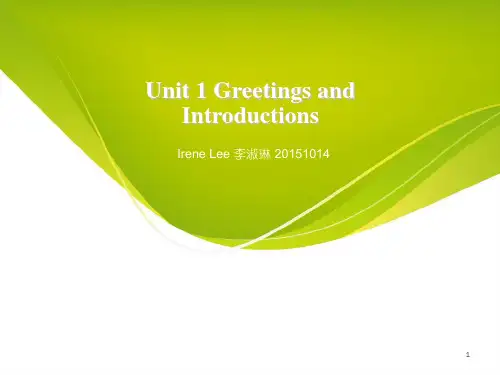

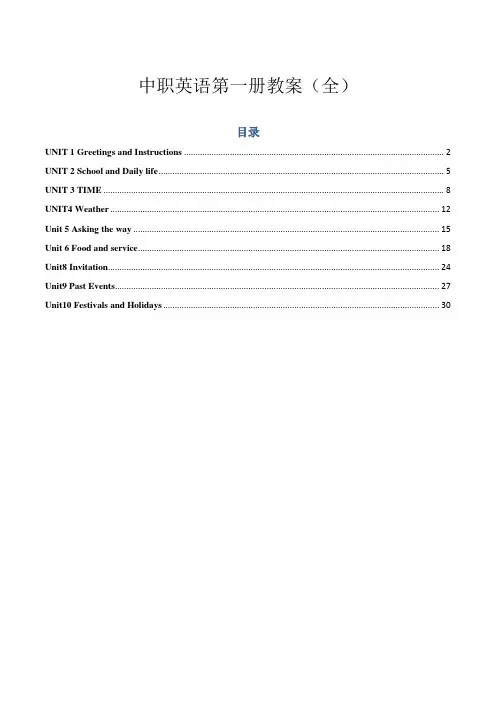
中职英语第一册教案(全)目录UNIT 1 Greetings and Instructions (2)UNIT 2 School and Daily life (5)UNIT 3 TIME (8)UNIT4 Weather (12)Unit 5 Asking the way (15)Unit 6 Food and service (18)Unit8 Invitation (24)Unit9 Past Events (27)Unit10 Festivals and Holidays (30)UNIT 1 Greetings and Instructions一、词汇(课本14页)1. addresspostal addresspostal adj. 邮政的2. bossThis is my boss.worker3.call【教材原文】Please call me Jianjun.请叫我建军好了。
①.命名,把…叫作call sb.sthMay I have your name?call me Tom.叫我汤姆吧。
②call on sb.拜访某人call at sp.拜访某地(3)打电话call sb.(up)给某人打电话I’ll call you this evening.今晚我将给你打电话。
(4)m.电话give sb. a call 2给某人打电话make a phone call打电话This is my friend Mary (call)4. computer5. customer6. e-mail7. greet 打招呼,问好greeting n.问候(通常用复数)【教材原文】Can you greet people in English? 你会用英语打招呼吗?greet each other彼此问候、彼此打招呼We greet each other with smile.我们微笑着彼此打招呼。
中职英语第一册教案 nice to meetyouLesson 1: Nice to Meet YouAims:- To introduce basic greetings in English.- To practice introducing oneself to others.- To learn some common expressions for making introductions.- To develop listening and speaking skills.Objectives:By the end of the lesson, students should be able to:- Greet and respond to greetings in English.- Introduce themselves using basic information.- Use the expressions "Nice to meet you" and "How do you do?" - Engage in short conversations to get to know their classmates. Materials:- Whiteboard and markers.- Flashcards with different greetings and expressions.- A song or video clip with greetings and introductions. Procedure:1. Warm-up (5 minutes):- Greet the students as they enter the classroom and encourage them to respond in English.- Play a short video clip or song with greetings and introductions to get the students engaged.2. Introduction (5 minutes):- Show the flashcards with different greetings and expressions,and elicit their meanings from the students.- Practice the greetings and responses with the whole class, drilling the pronunciation.3. Introducing Oneself (15 minutes):- Model an introduction by saying "Hello, my name is [your name]." Write the sentence on the board.- Have the students practice introducing themselves in pairs, using the sentence structure.- Circulate around the classroom and provide assistance and feedback as needed.4. Expressions for Making Introductions (10 minutes):- Introduce the expressions "Nice to meet you" and "How do you do?" to the students.- Write the expressions on the board and explain their meanings. - Practice the pronunciation and intonation of the expressions as a class.- Have the students role-play introducing themselves and responding using the expressions.5. Getting to Know You (15 minutes):- Divide the class into small groups and have them sit together. - Give each group a list of questions (e.g., "What is your favorite color?" "Do you have any siblings?") to ask each other.- Encourage the students to introduce themselves and engage in conversations using the expressions they have learned.- Monitor the groups and provide assistance and feedback as needed.6. Wrap-up (5 minutes):- Gather the whole class together and ask a few students to share something interesting they learned about their classmates.- Review the greetings and expressions learned in the lesson, and give positive feedback to the students.Note: This lesson plan is based on a 45-minute class period. Adjust the timings and activities as needed to fit the length of your class.。
中职英语基础模块第一册unit1. Introduction to UnitThe first unit of the vocational English basic module introduces students to the fundamentals of the English language. This unit serves as a foundation for the subsequent modules, laying the groundwork for essential language skills and knowledge. The unit aims to assist students in developing basic communication skills, understanding grammar structures, expanding vocabulary, and improving listening and reading comprehension abilities.2. Unit ObjectivesThe objectives of this unit are as follows:•To introduce students to basic English grammar structures•To expand students’ vocabulary related to everyday life and common topics•To enhance students’ listening and reading comprehension skills•To develop students’ skills i n basic communication and conversation3. Lesson 1: Greetings and IntroductionsIn the first lesson of Unit 1, students are introduced to common greetings and introductions in English. The lesson focuses on essential phrases and polite expressions used in different social contexts. Students will practice verbal and written exercises, engaging in role plays and dialogues to reinforce vocabulary andexpressions. The aim is to ensure that students are able to confidently greet and introduce themselves in various situations.4. Lesson 2: Numbers and DatesLesson 2 covers numbers and dates in English. Students will learn how to count and pronounce numbers, both cardinal and ordinal, from one to one hundred. Additionally, they will become familiar with different ways of expressing dates, including the day, month, and year format. The lesson includes interactive exercises to reinforce comprehension and practical applications of numbers and dates.5. Lesson 3: Family and RelationshipsIn Lesson 3, students learn vocabulary related to family and relationships in English. They will acquire the vocabulary necessary to describe family members, as well as phrases used to discuss relationships and personal connections. The lesson encourages students to engage in discussions about their own families and relationships, providing practical application of the vocabulary in real-life situations.6. Lesson 4: Daily RoutinesThis lesson focuses on daily routines. Students will learn vocabulary and expressions related to activities in their daily lives. They will practice discussing their daily routines and schedules, as well as forming sentences using appropriate verb tenses. The lesson incorporates various listening exercises and interactive activities to enhance understanding and usage of daily routine vocabulary and phrases.7. Lesson 5: Asking for and Giving DirectionsLesson 5 introduces students to vocabulary and phrases used when asking for and giving directions in English. Students will learn how to ask for and give various types of directions, such as asking for directions to a place or providing directions on a map. They will engage in role plays and practical exercises to reinforce their ability to understand and communicate directions effectively.8. Lesson 6: Time Expressions and AdverbsThe final lesson of this unit covers time expressions and adverbs. Students will learn to express specific times and durations using appropriate vocabulary and adverbial phrases. They will engage in listening exercises and writing tasks to reinforce their understanding and usage of time expressions and adverbs in context.9. ConclusionUnit 1 of the vocational English basic module provides students with a solid foundation in English language skills. By focusing on greetings, introductions, numbers, dates, family, daily routines, directions, and time expressions, students will develop essential communication skills necessary for various real-life situations. The unit aims to build students’ confidence in their ability to understand and use English in a vocational context.。